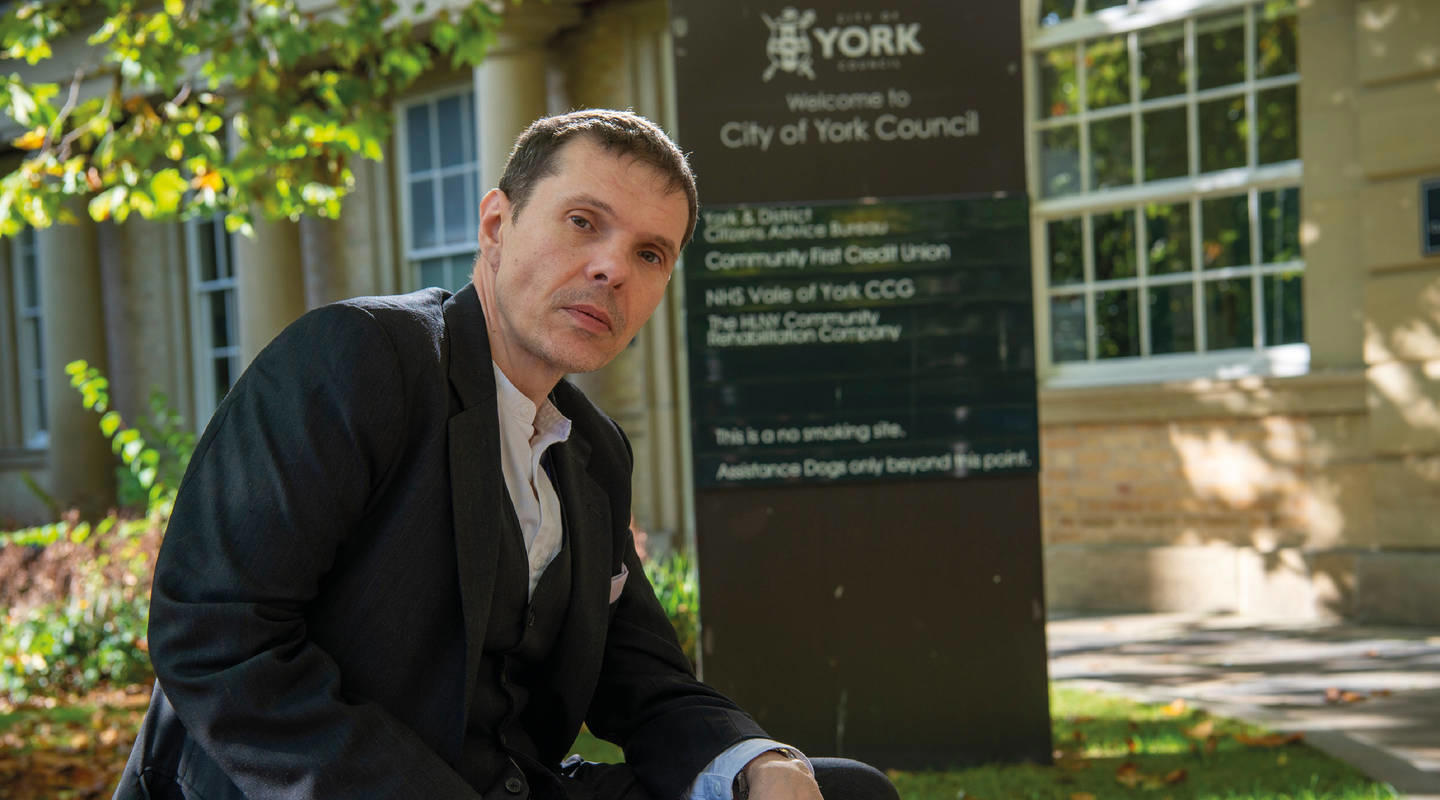People hoping to leave drugs or drink behind in York can seek help at 3 Blossom Street, a spiky red brick building situated between a Wetherspoon pub and Micklegate Bar, a medieval gateway made of stone.
Its reception leads on to a warren of clinic rooms, corridors and offices. A meeting room looks over a garden, a wilderness recently transformed by the generosity of a grateful family whose son sadly died. It’s here where we meet Andy Ryan, operations manager at Changing Lives, and Helen Chidlow, a GP for Spectrum CIC, a social enterprise, which provides clinical support. Together, they run the substance misuse service on behalf of City of York Council.
This is now a fairly typical arrangement in England, some six years after councils took over the purse strings of these services from the NHS.

Beefed up by investment by the last Labour government, charities have overtaken the NHS as the prime providers of substance misuse services, a shift further fuelled by austerity cuts.
Like many such services, the threat of cuts lingers still. But unlike most others, York’s has been spared another budget reduction, for this year at least, after an intervention by politicians, doctors, and the police.
So how does the service work? How did the campaign to survive cuts succeed? And what is the future for substance misuse services such as 3 Blossom Street?
Mr Ryan, a psychotherapist, says that his team of ‘asset coaches’ offers psycho-social support to those through their doors. They get to know them, help them find out the ‘why’ of their dependency.
‘There’s a reason why someone takes substances. It often lies outside the substance misuse,’ Mr Ryan says. ‘Is there a housing need? Another health need? A social network need?
'When someone has a problem with opiates and alcohol, the amount of people affected can be huge.’
We cannot allow doctors working hard in incredibly tough conditions to continue practising in fear.
Immediate needs
This psycho-social approach takes time, regular contact with the coaches, and for people to stay engaged. They run an ‘abstinence-based’ programme in a separate building for those who can attend five days a week. ‘It’s been massively effective,’ Mr Ryan says.
But before getting into the challenging work of recovery, people’s immediate medical needs must be met. This is where Dr Chidlow comes in.
‘While people are feeling really unwell, their ability to take part in meaningful recovery is limited,’ she says. You can’t recover when you’re dead, is how one slogan doing the rounds puts it. ‘It’s a strong message,’ Mr Ryan admits.
‘If you’re using heavily, you can have pipe dreams of recovery, but if you’re not in a safe medical place, what chance have you got?’
 Helen Chidlow
Helen Chidlow
Dr Chidlow’s team screens for blood-borne infections, such as HIV virus and hepatitis. They manage detox for those who want to quit, an often intense process initially. They step back when patients are stable.
‘We don’t want to over-medicalise it,’ says Dr Chidlow. ‘For some who present, the substance abuse is the whole problem. They’re like, please take it away. Please fix this. It’s to get them to a point where they can deal with what the issues really are.’
Changing Lives and Spectrum CIC took over the service in 2017 on condition they would find £500,000 of ‘savings’ in five years.
The largest cut, of £213,000, was expected this year. But in an unusual reversal, the council agreed to a two-stage ‘release’ of funding – almost matching the planned ‘saving’ – after hearing evidence about its potential effect.
This evidence was gathered earlier this year by York’s health and adult social care policy and scrutiny committee, the council equivalent of the Parliamentary select committee. As a former probation officer in the city, its then chair, Labour councillor Michael Pavlovic, knows something about substance misuse services.
 Michael Pavlovic
Michael Pavlovic
‘I would say to my clients, did you go to your appointment? They’d say, oh no, I couldn’t get in,’ Cllr Pavlovic tells The Doctor.
‘That is what happens,’ he says. ‘The motivation to quit can be transitory. People might see someone overdose or overdose themselves. They see something has to change and go for help, go for an appointment, but are told to wait.’
Hazardous drinking
The committee’s inquiry focused on York’s drinking problem. It’s a city well served. There’s a place to buy alcohol for every 200 adults. Some 7 per cent drink at ‘hazardous levels’, doctors told the committee, raising concerns of a ‘ticking time bomb’ of health problems. York GPs are treating more and more patients with dementia, blood-pressure problems, and cancers from drinking.
Hazardous drinking hits its hospitals too, says NHS Vale of York Clinical Commissioning Group, which funds them.
York Teaching Hospital NHS Foundation Trust sees ‘significant problems with stomach and liver ailments from high-functioning drinkers’, the scrutiny report says. Staff struggle with demand, despite their best efforts.
‘The situation is likely to worsen’ if budget cuts curb access, the committee heard. The evidence goes on: one in 10 people attend emergency departments, owing to alcohol. One in five arriving by ambulance are intoxicated. The cost? £2.6m to a trust already under financial pressure.
The police told of thousands of crimes each year linked to alcohol but also how detox helps rough sleepers and street drinkers get back on their feet. While they still have trouble with one, named as KB in the report, ‘her more serious behaviour had been vastly reduced’ after help from drug and alcohol services, North Yorkshire Police chief inspector Rachel Wood said in a statement.
In its evidence, Changing Lives warned the cuts risked increased caseloads for its coaches and less frequent appointments, potentially moving from weekly to monthly.
Back at Blossom Street, Mr Ryan, a recovered addict himself, illustrates the effect of infrequent appointments with his hands. ‘If you see someone once a week, you’ll help them understand their problem and change. Then your funding’s reduced,’ he says, palms springing part. ‘You get one appointment every two weeks, it reduces again. You get one every three, every four,’ he adds, pulling them apart. ‘Success drops off. Touching base every three to four weeks is not going to work in drug and alcohol treatment.’
If you’re using heavily, you can have pipe dreams of recovery, but if you’re not in a safe medical place, what chance have you got?
 Andy Ryan
Andy Ryan
The motivation to quit can be transitory.
Dr Chidlow says she worries about growing caseloads. Deaths from drugs in York are high and rising, a trend under investigation by the authority. ‘Unlike many other health services we have a long-term continual relationship with people who are dying in their forties,’ Dr Chidlow adds. ‘That’s really sad, a tragedy. We have to absorb that and there’s often a critical eye on us.’
Mr Ryan says the scrutiny report was ‘a gift’. ‘We haven’t waited for this to happen,’ he adds. ‘The report was: this is going to happen. It was open and honest, not about blame and shame or papering over the cracks. We have untouchables in our budget. We can’t stop prescribing. We don’t want to affect needle exchange because of blood-borne viruses. These are fixed costs, so savings, unfortunately, sit with staff. If you reduce the numbers, you reduce capacity, and frequency.’
York Council’s Liberal Democrat executive member for health Carol Runciman says it’s forced to ‘pick up the pieces’ of Government austerity cuts. ‘All the concerns are important. It would be very unwise to ignore them.’ Changing Lives does a ‘tremendous job’, she says. She insists the money would have been put back without the scrutiny. ‘The most vulnerable are really important to us,’ she adds.
Cllr Runciman, however, refuses to comment on the planned big cut, or ‘saving’ as it’s so called, due next year. Council papers last month call this year’s financial reprieve an ‘emergency’ measure.
The fight for the service will continue in the political arena in York, Labour’s Cllr Pavlovic pledges. He now chairs the council’s audit committee, keeping track of its finances. ‘I recognise that efficiencies have to be made,’ he says. ‘But if you can’t give adequate support to people in the grip of addictions, those addictions will kill them.’
The evidence is all in. The fate of those who make it through the door of 3 Blossom Street, with the hope of giving up drugs or drink, now lays in the hands of York’s council.

